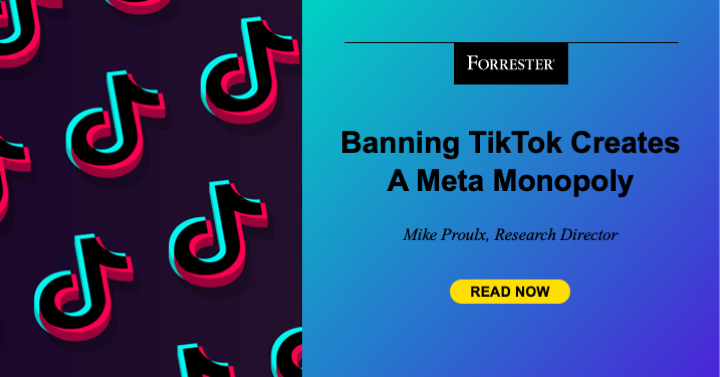The US House of Representatives just passed legislation that could determine the future of TikTok in the US — pending action by both the Senate and the President. Should the measure succeed, TikTok would effectively be banned in the US unless its China-based parent company, ByteDance, divests from the app.
Over 170 million people currently use TikTok, and recent Forrester data shows that 68% of US online Gen Z youths (ages 12–17) use it weekly — that’s more than any other social media platform surveyed (including YouTube, at 66%).
We ran an overnight quick “pulse check” poll in Forrester’s ConsumerVoices Market Research Online Community. We asked community members about their support of the US government forcing ByteDance to sell TikTok. The results are … unsurprising: The older and more conservative the demographic, the likelier there’s support of a forced sale. Those US online adults that support the measure include:
- Just over half of Baby Boomers.
- About four in 10 Gen Xers.
- Less than a third of Millennials.
- Nearly six in 10 Republicans.
- Just over a third of Democrats.
One ConsumerVoices community member who supports the forced sale sums it up by saying, “I think that people are giving up a lot of personal data to use TikTok, and a foreign owner could misuse it.”
*Note: This poll was administered to a random sample of 292 US online consumers in Forrester’s qualitative ConsumerVoices online community. This data is not weighted to be representative of the total US population.
Déjà Vu: TikTok’s Loss Is Meta’s Gain
As I blogged about last year, legislation regarding TikTok is about what could happen, not what is happening — it’s based on suspicion, not substantiation. As one ConsumerVoices member said, “There’s no proof that anything is happening behind the scenes that’s giving information to the Chinese government.” Another expressed desire for less regulation by saying that “requiring the sale of a component of a business feels like overreaching, even for the US government.”
Despite increased antitrust measures in Congress, a ban on TikTok will hand an effective monopoly to Meta’s Reels — the company’s short-form video product. Forrester’s Youth Survey, 2023, saw an 11-point year-over-year increase in Instagram Reels usage: Nearly a third (30%) of US teens now use Reels at least weekly. Absent of TikTok, users will flock to Reels, period — leaving just YouTube Shorts as its sole competitor. That means Meta is the likely beneficiary of TikTok’s ad revenue in a TikTok-less world, as well.
Most Marketers Are Investing More — Not Less — In TikTok
Forrester’s Marketing Survey, 2024, shows that 67% of US B2C marketing decision-makers said their organization plans to increase investment in TikTok this year, with only 7% saying they plan to decrease investment. With little to no other options to reach Gen Z via short-form video, ad dollars will divert to Meta. But is consumer privacy on other social media platforms that much different? One ConsumerVoices member who is against the forced sale of TikTok said, “I think there are political reasons that have nothing to do with TikTok. If you are banning to keep citizens’ privacy, then ban Facebook and Instagram, too.”
Forrester clients: Let’s chat more about this via a Forrester guidance session.








